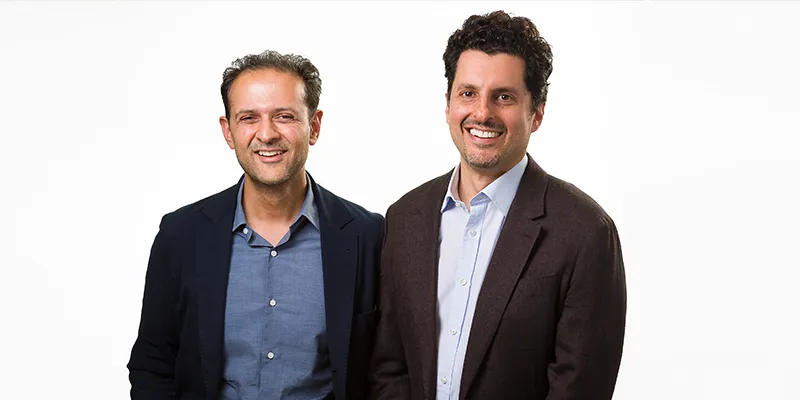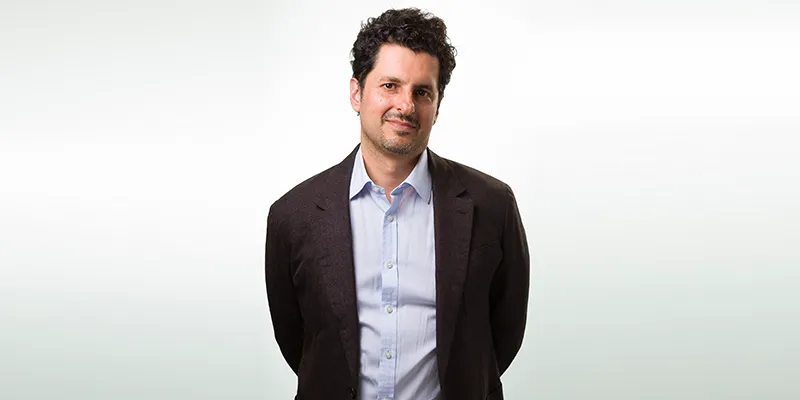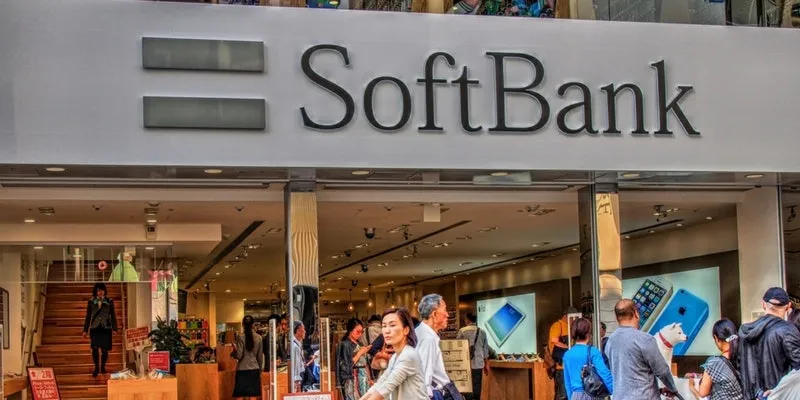Why this SoftBank-funded European ‘unicorn’ is not looking to lend in India
OakNorth Co-founder Joel Perlman spills the beans on funding from SoftBank, setting up in the US, and how this young ‘unicorn’ is planning to outpace itself.
Rishi Khosla and Joel Perlman are certainly not new to the entrepreneurial circuit. They met in college and, in 2002, set up what became one of the largest knowledge process outsourcing companies in the financial services space, Copal Partners, based out of India.
After a successful exit to Moody’s Analytics in 2014, the duo decided to start up once again. Keen to build a global fintech firm, they set up OakNorth, a commercial bank in the UK.
Their track record got Indiabulls Housing Finance to fund the venture with seed capital in 2015. Earlier this month, OakNorth was back in news for becoming the fastest growing lending ‘unicorn’ in Europe and securing a $440 million mega funding round led by Japanese conglomerate SoftBank. The deal gave the three-and-half-year-old firm a stunning $2.8 billion post-money valuation, double that of where it stood in 2017.

Founders of OakNorth (L to R): Rishi Khosla and Joel Perlman
Today, the group - which comprises a bank with lending operations in the UK as well as an AI-based platform for lenders - is gunning for the US to make its mark and looking to invest in businesses with millions in revenues and profitability on their balance sheets.
This begs the question: why is Europe’s biggest lending ‘unicorn’ not eyeing the $1 trillion digital lending opportunity in India? A week after disclosing the funding round, we caught up with OakNorth Co-founder Joel Perlman to ask him exactly this.
Edited excerpts of the interview:
YS: Just last week, Japanese conglomerate SoftBank invested close to $440 million in OakNorth. What do you plan to use the funding for?
Joel: We will be using the funds to start our lending operations in the US. We already have an office with 10 people in New York, which will act as our headquarters for the US. Keeping the expansion in mind, we will be increasing this team to 50 members over the course of this year. We will also be using the funds to strengthen our engineering teams as well as our credit analysis teams.
Looking at the size of the American market, we believe that the opportunity is big and scale is important. There are still certain niches that largely have unmet credit needs. And that is what OakNorth will look to take on.
YS: While the US is a credit-heavy market, don’t you think that it has a couple of existing players already? What is going to be your differentiation?
Joel: Our focus in the US will be on the lower mid-market segment (which is currently underserved), so we’re talking about loan sizes between $1 million and $30 million.
These ticket sizes are similar to our global strategy, where we structure every loan based on the needs of the customer. And our internal credit analysis, coupled with our proprietary AI and ML algorithms, allows us to do so. No player at present in the developed markets has these capabilities.
Another thing is speed. In developed markets, banks continue to be slow when it comes to loan deployments. OakNorth is helping reduce deployment speed of loans to these businesses from four months (from a bank) to just two weeks. However, we’ve done entire transactions in as little as five days, and this is where we want to get our average to.
In the US though, we will be co-lending for the moment in partnerships with banks.
YS: You’ve been housing your engineering and credit analytics teams in India for some time now. What are your plans for India?
Joel: We want to maintain India as our analysis and engineering hub. We have an engineering team of around 30 members in India based out of Bengaluru. A part of OakNorth’s engineering (team) is also based out of our London headquarters. With the funds in, we are planning to take this number up to 60 by the end of this year.
Including our credit analysis team (spread across Bengaluru and Gurugram) and engineering, we have a team strength of 300 in India. We plan to increase that to 550 members by end of this year. This involves growing our analyst strength from 200 to 400.
By 2020, we see our India team at 800, which will include 150 engineers.
YS: Rishi and you started back in 2001 in India and had a good run in the financial KPO space. Being privy to the Indian market, why not look at India for OakNorth’s operations?
Joel: Our priority initially was on developed markets, but we have deployed the technology in some developing markets such as Taiwan and Central and Eastern Europe. We have found that banks in developing markets have a more diverse set of challenges and this has helped us further refine our technology.
However, it still doesn’t make sense for us to deploy analysts to give loans in certain developing markets where demand lies in shrinking ticket sizes.
Also read: Indian fintech raised $5.4B in equity funding over the last three years, but where is it headed?
YS: You said you plan to double your analyst teams over the course of the year. Don’t you think that this number is expected to come down with the role of your proprietary AI and ML engines play?
Joel: We see things from a different perspective. Firstly, when we started in 2015, an analyst would spend close to 70 hours assessing a deal. Today, s/he spends close to 40 hours on a deal. We expect this time to fall further to 10 hours in the next 5-10 years.
Secondly, our algorithms do 70 percent of the heavy lifting; only the last level of diligence is manually handled by our analysts.
Further, there’s no doubt that our AI and ML product helps in faster cash-outs than the industry, improving our credit (related) decision-making. It also helps make our relationship managers more and more productive. A relationship manager in a legacy bank before joining us, would be helping a cash-out of $20 million. Our AI and ML empowers them to cash out close to $200 million.

Joel Perlman, Co-founder, OakNorth
YS: What is the average interest rate on loans you give out in the UK? Does manual intervention affect your costs and margins?
Joel: In the UK, we give loans at 8 percent. Two percent is our cost of funds while 6 percent is our net margin on these loans. Another 2 percent covers all other costs, including assessment. So, we salvage 4 percent on every loan we deliver. Most of our funds come from our depositors.
YS: How about your NPA (non-performing assets) cover then?
Joel: Until now, we haven’t seen a single default on our books. Also, we take 50 basis points as our NPA cover on every loan.
YS: What does your loan book look like? How do you look at growth, considering your American aspirations?
Joel: At present, we have an active loan book of $3 billion in the UK, constituting close to 300 loans. We plan to take this number to $4 billion by the end of 2019 across 500 loans.
Sixty percent of our loans are property loans and the rest are business loans secured against a property or an asset. If you look at our portfolio, we have given loans for property development to schools, nursing homes, and even manufacturing firms.
Also read: 10 trends that will shape the future of Indian fintech in 2019
YS: In the UK, you are also a digital bank. How are you different from the others there?
Joel: Our annual equivalent rate (AER) is much higher than most other banks in the UK.
(AER is a comparison of interest rates across accounts. It not just signifies the amount of interest but also takes into account on how often it is paid.)
At present, we have 40,000 accounts and we’re looking to almost double it in the near future.

Softbank led the recent $440 million round in the UK fintech, earlier in February.
YS: What is the average cost for implementation and the cost bracket, according to the volumes?
Joel: Unfortunately, I’m not allowed to share than with you. But I can say that the revenue runs in multi-millions for the platform.
YS: OakNorth prides itself on being a lending company, which is profitable. But with such growth in mind, do you see your profits shrink?
Joel: We made £28 million in revenue in 2017, and a profit of £10.6 million (pre-tax). In spite of the growth, we do not see profitability shrinking. This year, we are expecting our profits to grow by 3x over 2018.
YS: You raised $100 million in September last year and another $440 million from Softbank this month. How much of that growth capital is present for you as a runway?
Joel: It’s safe to say that we have close to half of it still in our bank.
YS: What is OakNorth’s biggest challenge?
Joel: Our biggest challenges is the path to a $100 billion valuation, which we don’t have yet; what is the business model that will take us from a $10 billion valuation to $100 billion? We might have a view towards $10 billion, but $100 billion is going to be tough! Right now, we are sticking strongly to lending.







